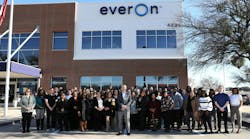There are plenty of ways to transform a security company — a marketing campaign, a name change, a new sales strategy based on years of experience, targeting a new and/or emerging market, an influx of new talent, and even selling to the highest bidder — the possibilities are vast.
CarterBrothers, SD&I magazine’s 2015 fastest-growing security integrator in North America, has proven that a multi-faceted growth strategy including a little bit of all of those things is a key to a successful playbook.
A Clean Slate
CarterBrothers has undergone a complete transformation in the past three years. Back in October 2012, Cris Carter, chairman, and John Carter, president of the company known then as Carter Brothers LLC, sold the fire & life safety and commercial portion of their business to Tyco Integrated Security. The acquisition was more specifically Edwards Service, a fire safety company Carter Brothers acquired from GE Security in 2007.
In the years since the acquisition, John and Cris have rebuilt a new company from the ground up, using a combination of acquisitions to be able to deliver on the CarterBrothers (CB) philosophy of targeting what CEO John Carter calls “national accounts” — enterprise and corporate customers with expansive operations across multiple locations. “The opportunity came when we got out of the fire business after selling to Tyco,” Carter explains. “We thought there was a unique opportunity to focus on some other national account areas and really expand our sales in those markets.”
Leveraging both Carter brothers’ past experience in the security market has been one of the keys. “I don’t think anyone can buy a company from General Electric and not learn a lot,” John Carter says. “I think that I had some great mentors at GE that really coached me along through a lot of the deal. It was really helpful for us.”
The expansion happened rather quickly. Carter’s strategy, along with a few acquisitions, has propelled the company to huge growth numbers over the last three years both in terms of dollar growth and more so in percentage growth —something the Carter Brothers have not been a stranger to in the past.
“We grew our business 20-30 percent in a down economy,” Carter said of the previous incarnation of the company. “We did that focusing on national accounts – that’s really the opportunity out there in the marketplace — so we took those same principles and went back to re-apply them.”
Inside the Strategy
Carter stresses that his go-to-market strategy is simple: target those national accounts, focus on the customer’s needs in a unique way, and bring them a total integrated solution that goes beyond cameras, locks and alarms. “I just don’t believe there’s a true champion out there right now in national accounts,” Carter says. “Small to mid-sized businesses on a national account perspective — multi-location companies — is a huge growth area. Those are the opportunities we’re looking for.”
Serving the enterprise customer, of course, is easier said than done successfully. Perhaps the biggest challenge is formulating lasting relationships with large corporations —something Carter says his firm is sharply focused on. Still, the basic tenets of security services — or any service-based business, for that matter —reign supreme.
“One is we really done a good job of focusing on the customer’s need — not selling them our solution, but really looking at what they are looking for, what problems they want to solve, and how we can do that,” Carter says. “I think we’ve been pretty successful at showing them that value-added service — not only after we sell, but keeping them as updated as possible on technologies and what they are capable of doing. We really have driven their ability to look at technologies, their projects and their opportunities. I think that’s really been helpful from an overall growth standpoint.”
Another key to growth has been the involvement of Cris, who is chairman of the company and fresh off his 2013 induction into the NFL Hall of Fame. “He is more involved than you know,” John Carter says. “Cris is your typical great athlete — you give him a playbook and he will go (try) to perfect it. We call all of our strategic books ‘growth playbooks.’ It’s something we picked up out of the GE world, but Cris reads them and understands them; then he spends time in the offices and spends a lot of time with customers. I think that’s been very valuable to what we are doing today.”
Acquisition for Integration
CarterBrothers made its most important strategic acquisition in Jan. 2014, purchasing D&N Electric Company — which enabled the Carters to expand their integrated enterprise security offerings by providing scalable electrical solutions.
“The D&N acquisition will broaden the playing field for CB, giving us the capability to offer high- and low-voltage electrical installation services with consistent, cost effective solutions to our clients through planning, design, procurement, installation, and maintenance,” Cris Carter said in a statement.
While it was, of course, not their sole source of growth in 2014, the acquisition was the fuel that powered CB to new heights in the past year.
“It gets us in people’s offices doing tenant improvements and more maintenance and service, because we have the ability to add on the electrical side of things,” John Carter explains. “Again, it gives us more options to be able to provide to the customer.
“Take a large, multi-regional customer that I’m doing backup power for on my electrical side — now my electrical guys can start selling them on security solutions and more of an integrated platform,” Carter continues. “Everybody talks about a smarter building, but who really has the ability to do it without having the electrical side in place? Either you have it or your sub it out. It has definitely given us a lot of RMR opportunities, along with a lot of upselling opportunities.”
Hurdles
Of course, no company has an easy road to travel when it comes to rapid growth. CB has had its share of challenges. There is an ongoing lawsuit stemming from the original sale to Tyco; and another class action involving worker salaries. With its high-profile ownership, CB is an obvious target for extra media scrutiny in these cases, so handling them from a public relations standpoint is paramount.
“We have been blessed to do a lot of business with big companies, but that means when they go through something, we go through the same things with them,” John Carter explains. “We understand that and we manage it accordingly.”
Regarding Tyco, Carter says: “Sometimes in partnerships, breakups have visibility that goes with them. I am comfortable it will ultimately be resolved.”
From a more conventional business challenge perspective, Carter —like many of his peers in this industry —sums up his biggest obstacle in a single word: Talent. Finding and attracting the right people with IT knowledge and backgrounds is becoming increasingly difficult.
“I think the industry doesn’t have the visibility it needs at times,” Carter admits. “People don’t see or understand the volume of work that’s going on in this space. Maybe that’s our fault for lack of visibility, but so many other industries drive their business differently. IT is a huge piece that’s out there, and we need to get some of these guys that have technology in their heads to be able to transfer into our marketplace — it is an absolute must.
“We have to do better at going after some of the best and brightest, and tell them that it is not just cameras and alarms,” he continues. “In the past, you didn’t need a huge technical background to get out there and install security, but the business has grown so fast through acquisitions and technologies that students don’t really realize what’s open to them.”
The D&N acquisition further opened Carter’s eyes to the possibilities. “One of the things that fascinated me about the electrical side is it allowed me to bring in real engineers,” he explains. “They think differently about how they want to get things done — how things are integrated, why they are integrated that way, how one box talks to another box.”
Sticking to the Playbook
John Carter says frankly that he doesn’t have the elusive “recipe for success.” In fact, he says, the key to sustaining a growing security services firm is rooted in the core principles and foundations that make up those growth playbooks.
“I don’t have a recipe for success, but I have a recipe that has made us successful,” Carter says. “Integrator and security companies, big or small, have to protect their foundation, because without it, there’s no place to grow.
“We have been fortunate enough over 15 years to continue to protect our foundation, our core principles and customers,” he continues. “We have been able to bring more things to our core customers, which gives us a leg up on a lot of companies. We take our principles — why we got into this, why we are doing it, the value we bring to our community — and expand on it.”
Read more about the top companies in the SD&I Fast50 from all four years of the rankings at www.securityinfowatch.com/sdifast50 — and be sure to catch the Fast50 awards ceremony with John Carter and more at 4 p.m. on April 15 2015, on the lobby stage outside the ISC West exhibit hall.
Paul Rothman is Editor-in-Chief of Security Dealer & Integrator (SD&) magazine (www.secdealer.com).


